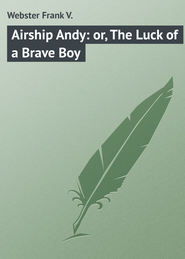По всем вопросам обращайтесь на: info@litportal.ru
(©) 2003-2024.
✖
The Boy Pilot of the Lakes: or, Nat Morton's Perils
Настройки чтения
Размер шрифта
Высота строк
Поля
"That's what he did," added the policeman. "He got away from me, too. Somebody get me a boat."
"What for?" asked the captain.
"Because I'm an officer of the law, and a prisoner has escaped. I had him a prisoner, all right, for I had my hand on him, but he went so sudden he got away."
"There's a boat moored alongside," said the captain, when matters had been briefly explained. "But you want to hurry. I can't lay here all day, though how I'm going to sail without a mate is more than I know."
"I'll get him for you, but I'll have to take him right away again," said the officer. "He's a criminal and a fugitive from justice."
The mate might have been almost anything, as far as any denial on his part was concerned, for not a trace of him had been seen since he jumped overboard. Sam Shaw, mean as he was, had a genuine affection for his uncle, and he was much distressed about his relative.
"He's drowned! I know he's drowned!" he exclaimed, as he walked about the deck, half crying.
"Oh, dry up!" advised Nat savagely, for he knew the mate was a good swimmer, and he had no doubt but that Bumstead had managed to reach shore, under cover of the semi-darkness, and was far enough away by this time.
Meanwhile, the policeman got into a boat and rowed about, but all to no purpose. The mate had disappeared as completely as if he was at the bottom of the lake.
"Well," said Nat, much disappointed, "that's done with. It's a failure. I guess I'd have done better if I'd gone alone, and not taken the policeman with me, though he meant well enough. Now I'd better get some breakfast and then arrange to have some one row me out to meet the Mermaid."
He told the officer that he would have to leave.
"Very well," replied the policeman. "You may go, but I'll never give up hunting for my prisoner. It's the first time one ever got away from me, and I'm not going to stand it. I'll keep hunting until I find him, if it takes all day or a whole year. You had better leave me your address, and as soon as I arrest him, I'll let you know."
"I don't believe that would do any good. I travel about so, on the boat, that I can't tell just what my address will be. You had better give me the warrant; I may run across him at some other port."
Rather reluctantly the policeman gave up the legal document.
"I wish I had handcuffed him at first," he said. "Then he couldn't have gotten away, and if he jumped in the water he would have been drowned."
"I wouldn't care about having that happen," said Nat.
"Me either, though I hate to let a prisoner get away. But I'll catch him yet, you see."
And when Nat had gone ashore, eaten his breakfast in a little restaurant, and was being rowed out to be picked up by the Mermaid, the policeman was still searching about the dock and adjacent shore for the missing mate.
Captain Turton and the pilot sympathized with Nat over the failure of his mission, but they said Bumstead was sure to be arrested sooner or later.
"He'll probably transfer to some other boat, now," said Nat.
"Very likely," answered Mr. Weatherby. "He knows you are after him, and it's going to be harder to arrest him."
The Mermaid proceeded on her way, and for some time Nat was so occupied with his work, for there was a great increase in passenger traffic, that he almost forgot about the rascally mate and the stolen money.
Meanwhile, as my young readers have probably surmised, Bumstead had safely reached shore and had arranged to keep out of the way of officers of the law. The sudden appearance of the policeman in his cabin had been the first intimation that there was a warrant for his arrest, and that Nat knew of his appropriation of the fifteen hundred dollars belonging to Mr. Morton.
It is true the mate had fancied Nat was suspicious, after the lad had seen the wallet, and questioned him about it, but, when some time passed, and nothing resulted, the scoundrel thought that Nat either had his suspicions lulled, or did not know how to go about recovering the money. That a previous plan to arrest him had failed, by his shift of vessels, the mate never dreamed.
Now he knew he must make another change. It would not be safe to remain aboard the Spray. Accordingly, when he had reached shore, after his sensational leap for liberty, he sought refuge with a man he knew at Cove Point. He remained there until he heard that Nat had left, and that the policeman, very reluctantly, had given up the search.
Then the mate sent for his nephew, and the pair took what money was coming to them and left town. About two weeks after this the mate secured a place on the freighter Liberty Bell, which plied up and down Lake Huron.
"Uncle Joe, what did that officer want?" asked Sam Shaw of his relative, one day, when he happened to mention their former place aboard the Spray. "Was it in connection with that charge you made against Nat before the pilot board?"
"Well – er – yes – that was it. They wanted my testimony."
"Why don't you give it to them? I'd like to see that Morton chap locked up. How did he escape being sent to jail on your charge?"
"I don't exactly know," replied the mate. "I guess he is only out on bail."
"I hope they send him to prison for a long time. I can't bear him, he's so stuck up, thinking he's a regular pilot."
"Well, I'll fix him," murmured the mate. He did not want his nephew to know about the accusation Nat had made, for he was afraid Sam might, unconsciously, betray him. Nor was the mate altogether easy regarding the charge he had made before the pilot board. He had read in the papers about that case, and how he was wanted for contempt of court. He thus had to face two charges, and he knew he must be very careful when he went ashore, lest he be arrested.
"We'll meet the vessel that Morton fellow is on, this trip, Uncle Joe," went on Sam.
"How's that?"
"Well, we're going to Bay City, and the Mermaid is coming to Detroit, according to the papers."
"Is that so?" asked the mate, suddenly interested. "I wonder where we'll pass her?"
"About Ludlow's Island," answered Sam, who was developing a good knowledge of the lakes.
"Ludlow's Island," repeated the mate. "The channel there is quite narrow. We'll have to pass quite close."
"Do you think he'll see you, Uncle Joe?"
"No – of course not. What does it matter? I'm not keeping out of his way. I had certain reasons for not wanting that officer to take me to court; that's why I leaped overboard that time."
"Oh," answered Sam, who had not heard the explanation given by Nat and the policeman.
"So we'll pass his vessel quite close," murmured the mate, when his nephew had left him. "That's my chance. If I can be left in charge of the wheel I think I can make Nat Morton wish he had never interfered with me. Let's see, we ought to get to Ludlow's Island to-morrow night. I hope it's dark or foggy."
Meanwhile, all unconscious of the perils in store for him, Nat was, that same day, guiding the vessel of which he was now officially the assistant pilot toward Detroit.
"It's going to be a thick night," said Mr. Weatherby, as Nat relieved him in the pilot-house, the evening of the day after the conversation set down above between Sam Shaw and his uncle. "I think there will be quite a fog before morning. Don't take any chances. If you're in doubt call me, but I'd like you to try your hand at taking the ship past Ludlow's Island. It's one of the worst places in the lake, and when you've been through that, in a fog, you're almost entitled to a pilot's license."
"I'll try it, Mr. Weatherby."
"That's the way to talk."
As the night came on the fog increased, until Nat decided he would slow down to half speed. The bell and whistle were kept going at regular intervals, and two men were stationed in the bow as lookouts.
It was close to midnight when Nat, who had decided to ask to be relieved, for he was a little doubtful of his ability under such bad conditions, saw through the haze another vessel approaching. He was in the narrowest part of the channel.
"There isn't time to send word to Mr. Weatherby now," he thought. "I'll wait until I pass that ship. Then I'll go below, for I'm getting nervous here."
The two vessels were approaching nearer and nearer to each other. If Nat had been aware that the ship he was about to pass was the one on which was his enemy, the mate, doubtless he would have been more nervous than he was.










